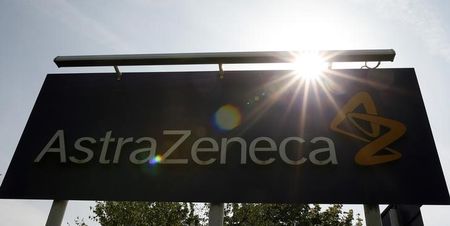By Ben Hirschler
LONDON (Reuters) - AstraZeneca's (L:AZN) cancer drug pipeline received a boost on Friday, as European regulators recommended approval of an experimental medicine against ovarian cancer.
The green light from the European Medicines Agency (EMA) for olaparib, or Lynparza, is welcome news since the product hit a road bump in June when a U.S. panel voted against its accelerated approval.
AstraZeneca has flagged the medicine as a potential $2 billion-a-year seller.
Olaparib blocks an enzyme involved in cell repair and is designed for patients with certain hereditary gene mutations. It also has promise in treating other cancers, opening up a substantial market opportunity.
"We are committed to investigating the full potential of olaparib and have a number of studies underway in multiple tumour types including breast and gastric cancer," said Briggs Morrison, AstraZeneca's chief medical officer.
The treatment is expected to be the first drug in the so-called PARP inhibitor class to reach the market in Europe.
The EMA said its committee of experts on new drugs also recommended approval of Pfizer's (N:PFE) Duavive for oestrogen deficiency, Baxter International's (N:BAX) Rixubis for haemophilia and Clinuvel's (AX:CUV) Scenesse for phototoxicity.
Recommendations for marketing approval by the European Medicine Agency's Committee for Medicinal Products for Human Use (CHMP) are normally endorsed by the European Commission within a couple of months.
An AstraZeneca spokeswoman said a final decision on olaparib's approval was now expected in January 2015. The British company also hopes to hear back from regulators on the approvability of the medicine in the United States by Jan. 3.
Cancer medicine is central to AstraZeneca's claims that it has a strong independent future, after fending off a $118 billion takeover bid from Pfizer (N:PFE) in May.
As part of its defence, the British drugmaker set out a bullish set of forecasts for its drug pipeline and predicted that group sales would climb 75 percent by 2023.
Most interest is focused on the company's rapidly developing line-up of experimental immunotherapy treatments, which boost the immune system's ability to fight cancer. Research presented at a cancer congress in Madrid last month suggests AstraZeneca is in a strong position in this field.
Shares in AstraZeneca pared losses by 1130 GMT to stand 0.6 percent down on the day, after falling as much as 2 percent earlier on news of an $11 billion share buyback plan by Pfizer.

Some investors saw the move as reducing the likelihood that Pfizer would renew its pursuit of AstraZeneca, although analysts cautioned against reading too much into the U.S. company's decision to continue its share repurchase plans.
(Editing by Tom Bergin and Clara Ferreira Marques)
